Feb-03-23
 | | KEG: In 1902, Marshall had still not found his mojo. As of the time this game was played, he was battling for a top prize at Monte Carlo 1902. With his win over von Popiel, Marshall at least temporarily into third place just behind Maroczy and Pillsbury (but in a virtual tie with Janowski and Teichmann). With his win in the following round over Teichmann and with Janowski losing), Marshall moved into clear third place only a hair behind the two leaders. When he won again in Round 15, it appeared that Marshall might duplicate his 3rd place finish at Paris 1900. But then it all fell apart for Marshall when he lost in games in each of the final three rounds. He thus finished in 9th place out of 20 competitors. The instant game reflects much of what was wrong with Marshall's game in 1902 and how far below the level of play he would exhibit in overwhelming a world-class field (including World Champion Emmanuel Lasker) at Cambridge Springs 1904. Marshall launched an unsound attack that might have cost him the game. von Popiel soon botched his chances, but then Marshall over-reached again, giving von Popiel new winning chances. On move 17, however, von Popiel needlessly sacrifice a piece. With further weak play by von Popiel, Marshall looked close to winning, but he seemingly gave away what looks like a theoretical win on at least two further occasions until von Popiel blundered away any chance of saving the game with his 31st move. Marshall seemed uncomfortably in playing defense after von Popiel's move 17 sacrifice, and Marshall's eventual victory was more the result of von Popiel's repeated errors than anything brilliant by Marshall. One must imagine that Marshall learned from his 1901-1903 experiences, and became the legendary player he did in 1904 as a result. (Of course, it was Marshall's bad luck that as he reached the apex of his play he was confronted by Tarrasch, Lasker, and Capablanca who were on a high level). 1. d4 d5
2. c4 e6
3. Nc3 Nf6
4. Nf3 Nbd7
5. Bg5 Be7
6. Rc1 0-0
7. e3
A standard position in the Orthodox Variation of the Queen's Gambit Declined. 7... b6
This line had its adherents, but the usual 7...c6 or perhaps 7...h6 were much better. 8. cxd5 exd5
9. Bd3 Bb7
10. h4
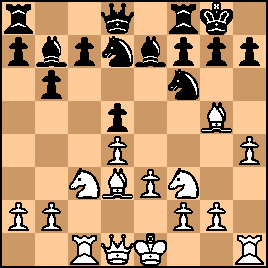
click for larger viewVery much in the style of the early Marshall. Simpler and probably sounder are 10. 0-0; 10. Bb5; 10. Qc2; and probably even 10. Qe2. Marshall's move, however, is entirely playable if sensibly followed up. 10... c5
11. g4?!
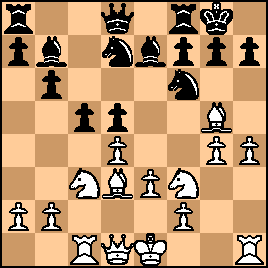
click for larger viewMarshall could have followed up his attacking scheme with 11. Bf5; and 11. h5 was also a live possibility. The text, by contrast, was simply bad. von Popiel, however, let him off the hook with 11...c4?: 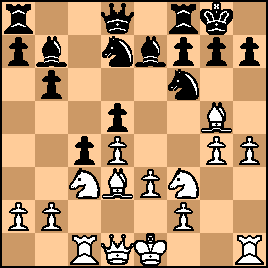
click for larger viewvon Popiel would have had serious winning chances after Marshall's rash 11th move with 11...Nxg4; e.g., 12. Bf5 Ngf6 and Black is a pawn to the good with few weaknesses. Marshall could now have cured the ills of his 11th move with 12. Bf5 or 12. Bc2. But, bizarrely, he decided to play: 12. Bb1?

click for larger viewThere seems little to recommend Marshall's move, but given what would soon transpire, what had been played to this point had little to do with how the game would develop. |
|
Feb-03-23
 | | Korora: Looks like Officer Pupp got Ignatz this time. ;þ |
|
Feb-04-23
 | | KEG: Post II
12... Re8
13. BxN
Marshall liked to attack, so he was probably chagrined at trading off this Bishop. He could perhaps have tried 13, Bf4, though von Popiel would probably have responded 13...Ne4 with equal chances. 13... NxB
13...BxB was probably best to anticipate Ne5 from White. 14. Ne5
With this Pillsbury-like move, Marshall had perhaps some initiative. 14... Bd6
14...Ne4 was surely best, since the "threat by Black of 15...BxN could now be easily be addressed with 15. f4, the position after 14...Bd6 was: 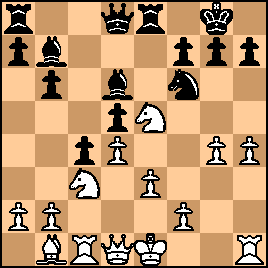
click for larger view15. g5?
This should have given von Popiel winning chances since by failing to play f4 Marshall would no longer be able to capture back on e5 with his f-pawn. 15... BxN
Of course.
16. dxB Nd7
17. f4
Too late! Black now gets to shatter White's attacking chances, the position now being: 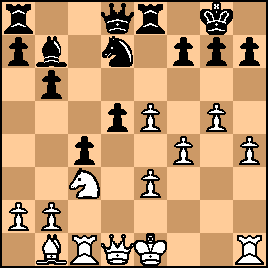
click for larger viewNow von Popiel, with the seemingly obvious 17...d4!, would have all the chances. The Tournament Book claimed that 17...d4 would be bad because of 18. Be4, but this is nonsense. If 17...d4 18. Be4 (??), Black wins easily with 18...dxN 19. BxB cxb2 20. Rxc4 Nxe5! 21. Rd4 [practically forced] Nf3+ and now if 22. BxN then 22...QxR! 23. QxQ b1(Q)+ 24. Kf2 Qxa2+ and Black is completely lost after 25...Rad8 White's only hope to survive after 17...d4 would have been 18. Ne4, but then Black retains strong winning chances, e.g., 18...Nxe5! 19. fxN Rxe5 20. Rxc4 [20. Qxd4 Qe7 and Black should probably win] BxN 21. Rxd4 Qe8 and Black has all the play. But von Popiel, either because he mistimed Nxe5 (which--as shown in the above variations could be powerful for Black) or because he though he was in trouble and had to take drastic measures including sacrificing a piece, or maybe because he preferring to be the one attacking in a game against Marshall, played: 17... Nxe5?!
Even after this wild move, von Popiel could have survived had he kept his head. But that was not to be: 18. fxN
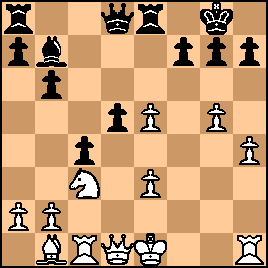
click for larger viewBlack--though no longer having any advantage--would still be OK with yet another seemingly obvious move: 18...d4! But, for whatever reason, von Popiel here played: 18... Rxe5
Now, Marshall was in business:
19. Qd4! Qe7
20. Kd2
Marshall was now up a piece for two pawns and was facing a desperate attack by von Popiel. Defense was not Marshall's strong point at this stage of his career (if ever!), and here he missed the stronger 20. Rh3. But even after the text, von Popiel's compensation for the lost piece was inadequate: 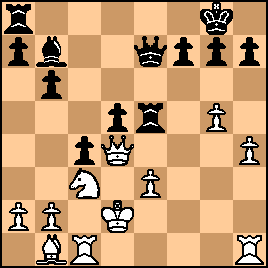
click for larger viewWhat followed from here--as I will discuss in my next post on this game--was weak play by both sides, and von Popiel, with a little help from Marshall managed to stay in the game until his blunder on move 31. |
|
Feb-04-23
 | | KEG: Post III
20... Re8
20...Rd8 was probably better, but in either case von Popiel's compensation for the sacrificed piece would have been inadequate. 21. Rce1
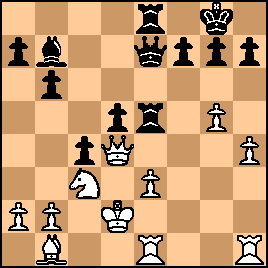
click for larger view21... b5?
21...Bc6 offered the most tenacious resistance. The text should have led to a quick demise for Black. The Tournament Book makes the obvious point that "Exchanges on e3 with an eventual d4+ were also insufficient." [i.e., 21...Rxe3 22. RxR QxR+ 23. QxQ RxQ 24, KxR d4+ 25. Kxd4 BxR 26. Kxc4 and White would be up a piece for two pawns in an easily won endgame (and would soon gobble up one or both of the Black Queen-side pawns). After 21...b5?, the position was:
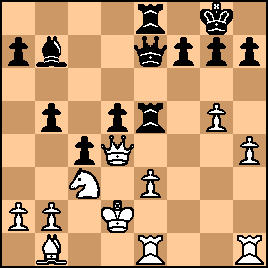
click for larger view22. a3?
Marshall must have seen ghosts. White wins without difficulty here via the simple and obvious 22. Nxb5 (e.g., 22...Qb4+ [the move that may have unnerved Marshall] 23. Nc3 Qxb2+ 24. Bc2 and Black's Queen is at least temporarily out of play and unable to prevent a King-side assault by White. After the time-wasting text, von Popiel was very much back in the game. 22... Bc6
23. Rhf1 a5
24. Rf4 b4
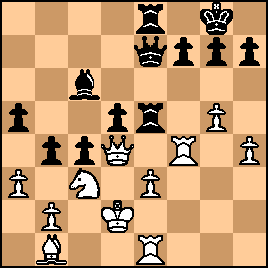
click for larger view25. axb4 axb4
26. Nd1 Qc7
27. Ref1 R8e7
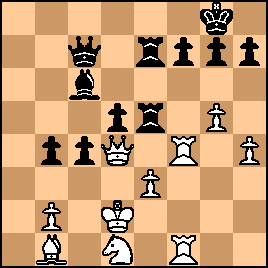
click for larger view28. R1f2
Very tentative play by Marshall. He should have played 28. Rf5 or maybe 28. Kc1. 28... Ba4
29. Bc2
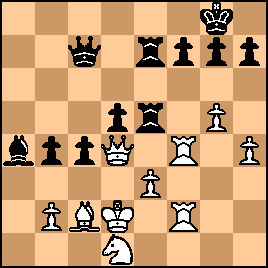
click for larger view29... Be8?
Very weak. He had to try 29...BxB or 29...Bc6 or 29...b3 or even 29...Bd7. 30. b3!
Putting the question to von Popiel, who had no good answer. 30... Bb5
Perhaps 30...Qb8 or 30...Qa5 offered marginally better chances. 31. Rf5
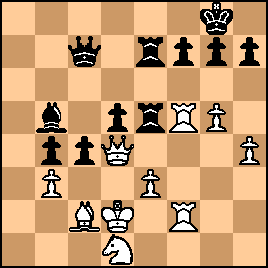
click for larger viewThe game was almost certainly beyond saving for von Popiel, and after his blunder on his next turn the only question was how much longer he could survive. Marshall had nearly botched the win before, but after von Popiel's move Marshall gave his opponent no further opportunities. |
|
Feb-05-23
 | | KEG: Post IV
31... c3+?
von Popiel's only slim hope of avoiding defeat lay in 31...cxb3. The text superficially looks good since White appears close to being in a mating net. But on closer examination, Black is now hopelessly lost. 32. Kc1
Black's last move would have worked splendidly had Marshall responded 32. Ke1?? in light of 32...RxR 33. BxR Qg3! Now, however, von Popiel's game crashed and burned: 32... RxR
There is nothing better.
33. RxR
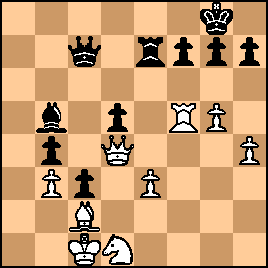
click for larger view33... Qa5
As the Tournament Book aptly stated here: "Black's attack is not so strong that White cannot survive." With Black down a piece, the insufficiency of his attack meant the game was effectively over. 34. Rxd5
The fact that Marshall had time to snatch this pawn was proof positive that von Popiel's defeat was fast approaching. 34... Qa1+
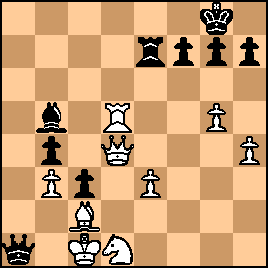
click for larger viewWhite's position looks more than a bit precarious, but, in the case of Black's attack, the emperor truly had no clothes/ 35. Bb1 Qa3+
36. Kc2 Be8
If 36...Ba4 37. Rd8+ Re8 (37...Be8 38. Qc5 Re6 39. Nxc3) 38. RxR+ BxR 39. Qd8 Kf8 40. Qd6+ Kg8 41. Nxc3. 37. Qc5 Re6
"?"--(Tournament Book)
While the text was hopeless, the Tournament Book suggests no alternative. 37...Qa7 would have allowed Black to linger on a bit, but after 38. QxQ the game would over. After 37...Re6, the position was:
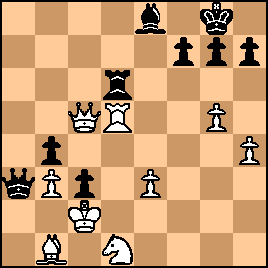
click for larger view38. Nxc3
"!"--(Tournament Book)
While it was surely tempting to eliminated the Black c-pawn, and while the text wins easily, even faster was 38. Rd8. 38... f6
Awful, but Black's game was beyond saving.
39. Rd8
Game over.
39... Kf7
This only hastened the end, but nothing else would have helped much. 40. Rb8
Getting rid of the Black b-pawn was one way to terminate resistance. 40. Nb5 was even faster. After 40. Rb8, the position was:
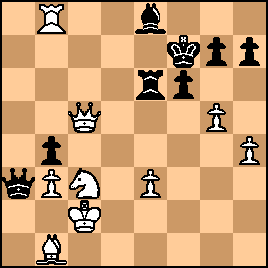
click for larger view |
|
Feb-05-23
 | | KEG: Post V
40... fxg5
Hopeless, but so was everything else. Perhaps Marshall faced some time trouble with the move-45 time control approaching. Nothing else explains von Popiel's desire to play on. 41. hxg5
41. Rb7+ or 41. Qf5+ would have led to checkmate in fairly short order, but the text--especially if Marshall face any time trouble, was an effective and practical (and winning) move. 41... Qa6
The only way to continue the game for even a few more moves. 42. Rxb4
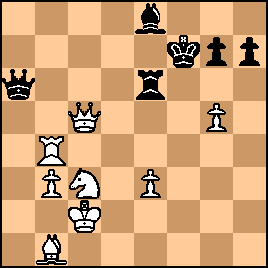
click for larger viewBlack's attack was now over...as was the game.
42... Qc6
Just about the fastest way to lose (other than resigning). 43. Rf4+
1-0
Giving up the Rook with 43...Rf6 was the only way to avoid mate in 3 (or faster). |
|
|
|
|





































